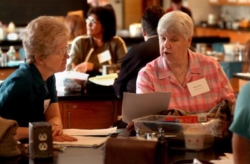Program helps teachers hone math, science skills
WESTON — America is losing its competitive advantage to other countries in science and technology and will be at an increased risk if it can’t at least double the number of students going into science, technology, engineering and mathematics careers. The growing gap is especially large for low-income students, many of whom learn mathematics from teachers who neither majored in the subject nor studied it for certification.
Regis College led a four-day workshop for mathematics and science teachers from Boston’s Catholic elementary schools (levels K-8). The intensive program, held June 26-29, was funded by a Title II grant from the federal government specifically targeted for improving teaching in “high need” low-income schools.
“The future of our nation depends on educating a skilled workforce and preparing citizens to function in a complex world,” said Regis College president Mary Jane England. “Every student must receive a solid grounding in math and science, fields where teacher shortages are the greatest. It’s important to our nation’s competitiveness in the global economy to graduate people skilled in math and science who can keep pace with students from other nations and secure the jobs with high technological requirements. We at Regis are pleased to be educating the teachers who will, in turn, be influencing those students,” she said.
The Regis workshop curriculum was designed to improve teachers’ skills in helping students comprehend mathematical and scientific concepts. It builds on the best standards and practices from National Council of Teachers of Mathematics, and introduces teachers to the latest teaching materials available.
Most of those who participated were experienced teachers who came to enhance their professional skills. More than half have participated in previous summer workshops at Regis.
“Teachers love to come to this workshop,” said Sister Barbara Loud, CSJ, chair of the Regis Mathematics Department. “They get peer support in a lively learning atmosphere. It’s fun. They learn as students would — by working at it. It’s not textbook-y; it’s hands on.”
During the workshops, the teachers were separated by grade level. There were two instructors for each grading group, one responsible for mathematics, and the other for science. The instructors worked together to provide an integrated approach and, especially for the early grades, also integrated their teaching with literacy development. They introduced children’s books that enable reading, as well as mathematics or science. Teachers were provided materials which will help them explore problem solving and reasoning.
“The workshop is a great opportunity for inner city Catholic school teachers to get innovative ideas and materials that they would not be able to get otherwise. It is great to share ideas with other teachers; it is truly a worthwhile professional development opportunity,” said Beth Sheehan, a 2nd grade teacher from St. Angela School in Mattapan. “We wouldn’t have this opportunity without this workshop because the schools do not have the funds to purchase these materials and such workshops are not readily available.”
There are 24 Catholic elementary schools in Boston, with over 5,900 students in grades PreK through 8. They are ethnically diverse with 50 percent white and 50 percent other ethnicities, and are overwhelmingly low-income.
<



















